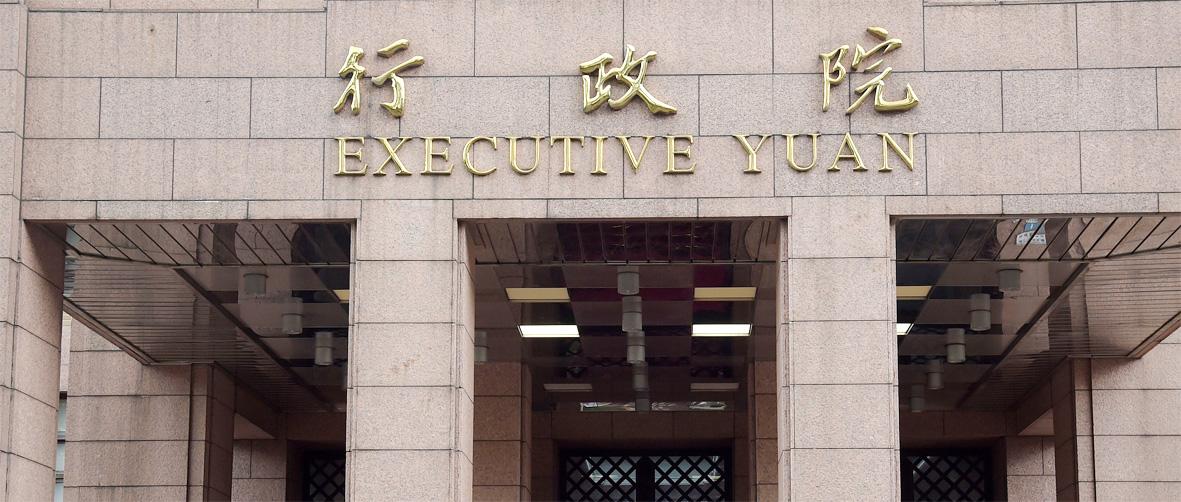The government has listed scores of state and privately owned enterprises as key parts of infrastructure that must be secured against cyberattacks, an Executive Yuan official said on Saturday on condition of anonymity.
Institutions listed by the government have the duty to meet cybersecurity standards, and a failure to report a possible or confirmed attack could be punished by a NT$5 million (US$175,982) fine, the official said.
The official declined to name the institutions, as doing so could compromise security, but said that there are no more than 100.

Photo: CNA
The local Chinese-language media have speculated that CTBC Bank (中國信託銀行), Cathay United Bank (國泰世華銀行), Taipei Fubon Commercial Bank (台北富邦銀行), Mega International Commercial Bank (兆豐銀行), Taiwan Cooperative Bank (合作金庫銀行) and First Commercial Bank (第一銀行) are on the list, given that the Financial Supervisory Commission had previously designated them as the nation’s six systematically important banks.
The Executive Yuan might also have included the Hsinchu Science Park (新竹科學園區), Central Taiwan Science Park (中部科學園區) and Southern Taiwan Science Park (南部科學工業園區), as they are deemed to be the operators of a significant part of the nation’s technological infrastructure, local media reported.
Additionally, Taiwan Mobile Co (台灣大哥大), Far EasTone Telecommunications Co (遠傳電信) and Formosa Plastics Group (台塑集團) are also likely to have been included, they said.
According to the Executive Yuan, critical infrastructure facilities in the energy, water resources, information technology, transportation, finance, emergency medical services sectors, central and local government units, and institutions and science parks would have to observe the regulations.
The Executive Yuan is defining critical infrastructure facilities as digital assets, systems and networks that, if they completely cease to operate or operated at lower efficacy, would severely affect national security, social and public welfare, public life and economic activities. All facilities meeting the government’s definition must enact measures, or attune existing measures to the new designated cybersecurity standards, while providing the central government with details on how they are implementing its cybersecurity updates.
Should the authorities find their plans to be lacking, they are obligated to demand that the facilities present a report on how they intend to address the shortcoming and bring their systems up to standard, the government said.
Any entity considered to be a critical infrastructure facility that fails to observe the new standards could be fined NT$300,000 to NT$5 million and must bring its facility in line with the standards within a given time frame, the government said.
Entities that fail to comply within the time frame could be fined consecutively for each infraction, it added.

The Ministry of the Interior (MOI) is to tighten rules for candidates running for public office, requiring them to declare that they do not hold a Chinese household registration or passport, and that they possess no other foreign citizenship. The requirement was set out in a draft amendment to the Enforcement Rules of the Public Officials Election and Recall Act (公職人員選舉罷免法 ) released by the ministry on Thursday. Under the proposal, candidates would need to make the declaration when submitting their registration forms, which would be published in the official election bulletin. The move follows the removal of several elected officials who were

FOUR DESIGNATED AREAS: Notices were issued for live-fire exercises in waters south and northwest of Penghu, northeast of Keelung and west of Kaohsiung, they said The military is planning three major annual exercises across the army, navy and air force this month, with the navy’s “Hai Chiang” (海強, “Sea Strong”) drills running from today through Thursday, the Ministry of National Defense said yesterday. The Hai Chiang exercise, which is to take place in waters surrounding Taiwan, would feature P-3C Orion maritime patrol aircraft and S-70C anti-submarine helicopters, the ministry said, adding that the drills aim to bolster the nation’s offshore defensive capabilities. China has intensified military and psychological pressure against Taiwan, repeatedly sending warplanes and vessels into areas near the nation’s air defense identification zone and across

SENATE RECOMMENDATION: The National Defense Authorization Act encourages the US secretary of defense to invite Taiwan’s navy to participate in the exercises in Hawaii The US Senate on Thursday last week passed the National Defense Authorization Act (NDAA) for Fiscal Year 2026, which strongly encourages the US secretary of defense to invite Taiwan’s naval forces to participate in the Rim of the Pacific (RIMPAC) exercise, as well as allocating military aid of US$1 billion for Taiwan. The bill, which authorizes appropriations for the military activities of the US Department of Defense, military construction and other purposes, passed with 77 votes in support and 20 against. While the NDAA authorizes about US$925 billion of defense spending, the Central News Agency yesterday reported that an aide of US

NATIONAL DAY: The ‘Taiwan Dome’ would form the centerpiece of new efforts to bolster air defense and be modeled after Israel’s ‘Iron Dome,’ sources said President William Lai (賴清德) yesterday pledged to strengthen the nation’s air defense capabilities and build a “T-Dome” system to create a safety net against growing military threats from China. “We will accelerate our building of the T-Dome, establish a rigorous air defense system in Taiwan with multi-layered defense, high-level detection and effective interception, and weave a safety net for Taiwan to protect the lives and property of citizens,” he said in his National Day address. In his keynote address marking the Republic of China’s (ROC) 114th anniversary, Lai said the lessons of World War II have taught nations worldwide “to ensure that